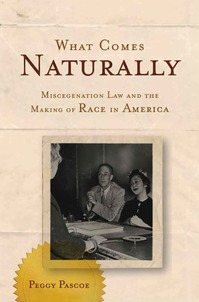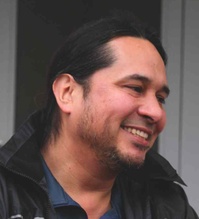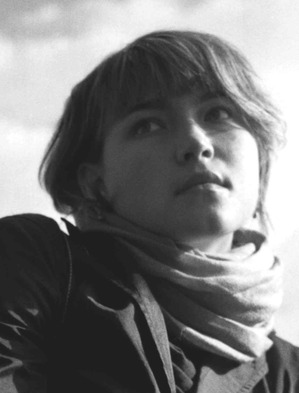 A young, sharp-dressed white man crosses a busy street on the way to dinner, arm-in-arm with his African-American wife. Today, some may look, while others won't even notice.
A young, sharp-dressed white man crosses a busy street on the way to dinner, arm-in-arm with his African-American wife. Today, some may look, while others won't even notice.
Forty years ago, this couple would have attracted a lot of attention -- perhaps even from the police. They could have been arrested, even imprisoned, simply for being married.
"Marriage discrimination is the longest lasting form of legal discrimination in U.S. history, longer even than slavery," said Peggy Pascoe, Beekman Professor of Northwest and Pacific History and Professor of Ethnic Studies. Pascoe is the author of the much-acclaimed book, What Comes Naturally: Miscegenation Law and the Making of Race in America (Oxford University Press, 2008).
What Comes Naturally concentrates on how both federal and state miscegenation laws -- those that prevented interracial marriage -- were sustained for centuries with two common justifications: interracial marriage was unnatural and it was against God's will. Such pervasive beliefs were integral to both legally institutionalizing the prohibition of such marriages and enforcing criminal penalties.
In 1967, the Supreme Court unanimously decided in Loving v. Virginia that racially based legal proscriptions on marriage were unconstitutional. At issue was an interracial couple's arrest upon moving to Virginia after having been legally married in Washington, D.C. By deciding in their favor, the Supreme Court put an end to miscegenation laws, both federally and at the state level.
Following Loving, Pascoe said, people rushed to say they were colorblind and that racism was over. Yet over time, society has not dropped its biases. In some parts of the country, a significant percentage of older Americans still oppose interracial marriage. And racism continues to thrive in the form of discrimination in our schools, prisons, criminal court dockets and housing markets.
Pascoe's book was an impassioned project 18 years in the making. It has received four notable awards in the past year. The Organization of American Historians presented her with the Ellis W. Hawley Prize and Lawrence W. Levine Award. The American Historical Association presented Pascoe with the John H. Dunning Prize and Joan Kelly Memorial Prize.
"I'm thrilled to have this kind of recognition from other historians," she said. Yet there is still much work to be done to achieve marriage equality. Case in point: The still-emotionally charged issue of same-sex marriage in the U.S. Nonetheless, Pascoe hopes that with time, our country will become less divided about what constitutes a marriage and, ultimately, a family.
- Anne Conaway


 When the volcano erupted, a UO professor discovered that local residents consoled themselves through song.
When the volcano erupted, a UO professor discovered that local residents consoled themselves through song.
 Join UO neuroscientists as they bring the host of the PBS series, The Human Spark into their brain research lab.
Join UO neuroscientists as they bring the host of the PBS series, The Human Spark into their brain research lab.  Temple Grandin, perhaps the world's best known person with autism, drew an overflow crowd to her UO talk.
Temple Grandin, perhaps the world's best known person with autism, drew an overflow crowd to her UO talk.

 Watch a slideshow about Elena Rodina's journalistic globetrotting, from the Arctic Circle to Cuba.
Watch a slideshow about Elena Rodina's journalistic globetrotting, from the Arctic Circle to Cuba.